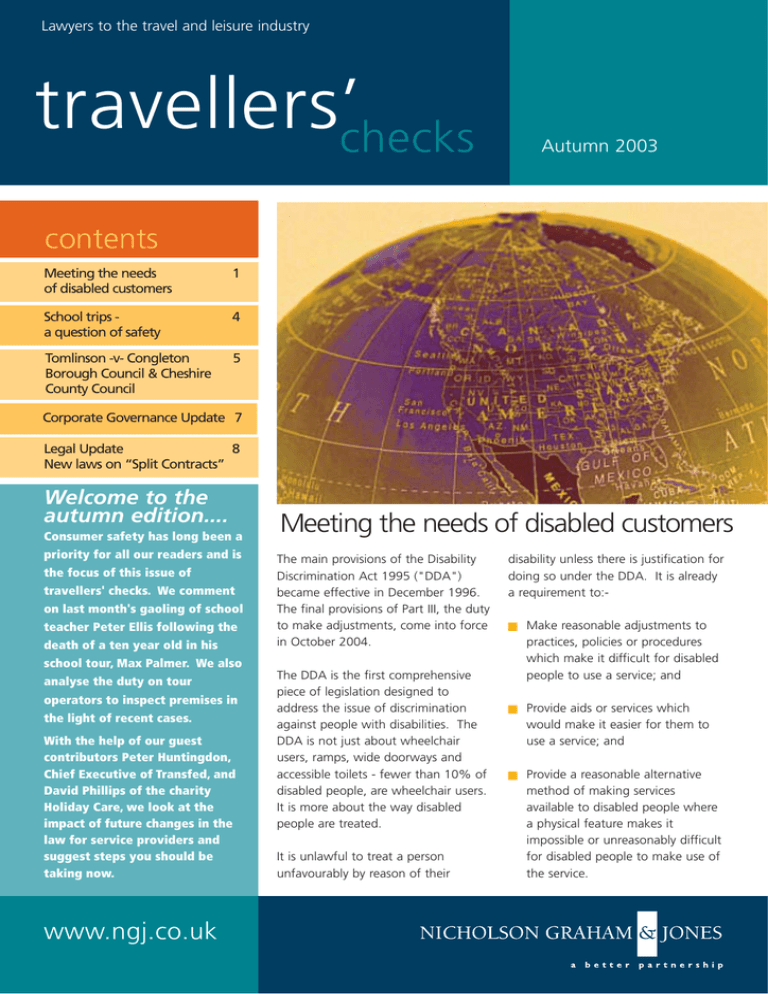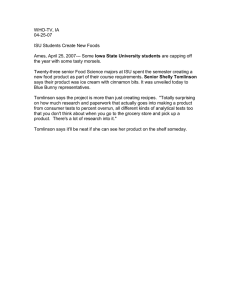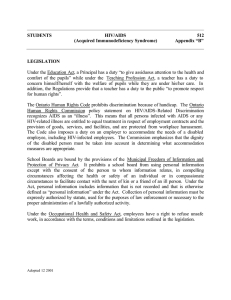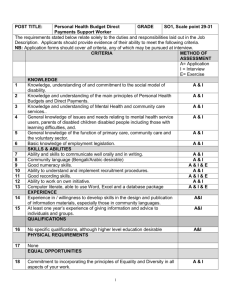travellers’ checks contents
advertisement

Lawyers to the travel and leisure industry travellers’checks Autumn 2003 contents Meeting the needs of disabled customers 1 School trips a question of safety 4 Tomlinson -v- Congleton Borough Council & Cheshire County Council 5 Corporate Governance Update 7 Legal Update 8 New laws on “Split Contracts” Welcome to the autumn edition.... Consumer safety has long been a priority for all our readers and is the focus of this issue of travellers' checks. We comment on last month's gaoling of school teacher Peter Ellis following the death of a ten year old in his school tour, Max Palmer. We also analyse the duty on tour operators to inspect premises in the light of recent cases. With the help of our guest contributors Peter Huntingdon, Chief Executive of Transfed, and David Phillips of the charity Holiday Care, we look at the impact of future changes in the law for service providers and suggest steps you should be taking now. www.ngj.co.uk Meeting the needs of disabled customers The main provisions of the Disability Discrimination Act 1995 ("DDA") became effective in December 1996. The final provisions of Part III, the duty to make adjustments, come into force in October 2004. The DDA is the first comprehensive piece of legislation designed to address the issue of discrimination against people with disabilities. The DDA is not just about wheelchair users, ramps, wide doorways and accessible toilets - fewer than 10% of disabled people, are wheelchair users. It is more about the way disabled people are treated. It is unlawful to treat a person unfavourably by reason of their disability unless there is justification for doing so under the DDA. It is already a requirement to:! Make reasonable adjustments to practices, policies or procedures which make it difficult for disabled people to use a service; and ! Provide aids or services which would make it easier for them to use a service; and ! Provide a reasonable alternative method of making services available to disabled people where a physical feature makes it impossible or unreasonably difficult for disabled people to make use of the service. travellers’checks From 1 October 2004 service providers will have an additional duty to:! Remove, alter or provide a reasonable means of avoiding physical features (or a reasonable alternative method of making the service available) which make it impossible or unreasonably difficult for disabled people to use their service. It is important to understand the extent to which changes to premises may be required and how to implement any changes if you are a freeholder or leaseholder. The duty to make physical adjustments applies to premises in the UK whether held freehold or under a lease and covers, for example, retail outlets, offices, airports and ports. Small businesses with fewer than 20 employees have been exempt from DDA requirements, but from 1 October 2004 this exemption will no longer apply. We recommend you start considering what physical adjustments may be required to your premises now. The points you should be thinking about are as follows:- All Premises ! Consider a disability audit of your premises - a non exhaustive list of adjustments which may be needed would include widening doorways, installing ramps, including tactile buttons in lifts, changing levels of light and other switches or handles ! Obtain the views of disabled customers - they know best what hurdles they face 2 ! Train your employees on DDA generally, and how to deal with requests for a reasonable adjustment the DDA but may be subject to future legislation). Specialist charities such as Holiday Care can provide more information about making the necessary changes. Leaseholder ! Check your lease to see if it provides that alterations may be made with or without consent - if not DDA will imply such wording ! Apply now to your landlord for consent to allow plenty of time for approval We asked David Phillips of the charity Holiday Care, to comment on the new provisions in the light of the needs of disabled customers. Since the Disability Discrimination Act (DDA) was introduced in 1996, much has been written in the travel press about meeting the needs of disabled customers. But this year in particular it is more important than ever to review what is being done to meet the needs of those who have specific access requirements, as 2003 has been designated the 'European Year of Disabled People'. In addition, in October 2004 the final phase of Part III of the DDA will be introduced in the UK. This will require all providers of goods and services to have considered what adaptations to premises might be reasonable to facilitate access by disabled customers, including those with sensory impairment. In a travel context this means that retail agencies, UK termini (including airports) and tour operators with public access will all have to consider these issues (means of transport are currently exempt under However, catering for disabled customers isn't just about premises. Travel agents, tour operators and UKbased airlines all need to review the way in which they handle enquiries from disabled customers - not only through shops, but also via the internet, reservations offices and direct line sales. The web is an increasingly powerful business tool both for the information, which it makes available, and the transactions, which it facilitates. So giving disabled customers equality of access to this service is important. The way in which business websites are developed has considerable significance for visually impaired customers, for example, as they rely upon a Microsoft-friendly text reader to scan and read the text to them. There are a number of systems that can be used to check how userfriendly a site is - e.g. 'Bobby Approved'. Accuracy of information given to customers is a priority for all travel businesses and this applies equally to disabled customers. For example, the means by which data about suitably accessible accommodation is collected and disseminated is critical in this respect. If a wheelchair user requires a ground floor room, it is vital to ensure that such a room really does exist and that this is recorded as a requirement for the holiday and not simply a request. Enquiries should be Autumn 2003 made about the suitability of transfers between the airport and the chosen accommodation as some 'package' arrangements may include a transfer using a vehicle that has several steps to gain access. If this is part of the 'package' then an alternative and accessible means of transfer will need to be provided. Consideration should also be given to the accessibility of excursions. Holiday Care provides a primary source of reference to disabled people wishing to travel in the UK and to some 40 overseas destinations. It also provides a consultancy service to the travel industry to help businesses meet the needs of disabled customers and to review their operations in the light of the DDA. Holiday Care, 7th Floor Sunley House, 4 Bedford Park, Croydon CR0 2AP Information Helpline: 0845 124 9971 Travel Industry Advisory Services: Tel: 0845 124 9974; Email:holcare.consult@virgin.net Web: www.holidaycare.org.uk 'Bobby Approved' - Contact: Watchfire International Headquarters, 211 Piccadilly, London W1J 9HF Tel: 020 7917 2962; Web: www.bobby.watchfire.com. We also asked Peter Huntingdon, Chief Executive of Transfed to comment on its response to the changes. It is four years since the video "It's a Bloody Nuisance" and training guide were launched by TRANSfED, the training arm of the Confederation of Passenger Transport, at Coach and Bus 1999. In the intervening period the law has changed (October 2002) to include duties affecting the conduct of coach and bus drivers and conductors, and the number of fully accessible DDA - compliant buses equipped with accessible features continues to grow. With this in mind, there is a clear need for up to date training material to help PCV operators and drivers understand and comply with legal duties and responsibilities. It is the intention of the Department for Transport and the industry, through TRANSfED, to update both the video and the guide and initial estimates are that this will cost in the order of £65,000-£70,000. DfT will be making a financial contribution to the project but we are also keen to secure financial input from the industry. The initial response has been encouraging and we are now well under way with the project. However, it is not too late for contributions from all interested associated companies, so that we can produce a high quality product that fully meets the industry's training needs. Companies representing urban, inter urban and rural services have been identified and filming began at the beginning of October. It is hoped that both the video and the amended guide will be ready by the end of November. TRANSfED plans to produce sufficient copies for all bus operators to receive a free copy for each of their operating bases together with a copy of the guide. All 3,000 of the print made in 1999 have now been distributed and it continues to be widely used within the industry. Additional copies of the video and the guide will also be available at a minimal cost to all companies and organisations who have an interest in this subject. Expressions of interest should be sent to John Smith c/o TRANSfED, Regency House, 43 High Street, Rickmansworth, Herts WD3 1ET. 3 travellers’checks School trips - a question of safety At the end of last year, the Department for Education and Skills issued new guidelines entitled "Standards for Local Education Authorities in Overseeing Educational Visits". In February 2003, we hosted a seminar which suggested practical solutions to reduce potential liability of tour operators, transport providers, teachers, educational visits coordinators or anyone involved in the planning of trips for groups of young people. The conviction for manslaughter of school teacher Paul Ellis on 23 September 2003 has highlighted the need for proper safety systems to be in place before any school trip is undertaken. The conviction arose out of the tragic death of 10 year old Max Palmer on a school outing to the Lake District. Paul Ellis was described by the Judge as "unbelievably foolhardy and negligent" for allowing Max to jump into a mountain pool following heavy rain. John Dunford, General Secretary of the Secondary Heads Association is quoted as saying "The plea of guilty will regrettably make teachers think twice about leading school trips". This was echoed by David Hart, General Secretary of The National Association of Head Teachers who said "Teachers might be deterred from running school trips in the future if they feel that they are at such risk, they could end up in the criminal courts". Mr Hart advised teachers to follow the guidelines issued by the Department 4 for Education and Skills on assessing and organising school trips and overseas visits. These guidelines recommend that Local Education Authorities should list questions which schools should ask contractors, such as tour operators, relating to safety management, and what to look for in the replies. Further, teachers should obtain assurances from service providers that risks have been assessed. It is good practice to seek details of any independent inspection based external verification. School tour operators need to be in a position to answer the detailed questions that are asked by Local Education Authorities and schools. They can only do so if they have a properly developed and implemented health and safety policy and procedure. It needs to be reviewed regularly. The same is true for any company in the travel industry both for the well being of its staff and clients. A good policy should ensure that the highest reasonable standard of safety for clients and staff is achieved. This means:! Taking all reasonable measures to reduce the risk of accidents. ! Ensuring that the component parts of our tours comply, where applicable, with local national and/or international standards, and maintaining records. ! Actively promoting safety awareness, continual assessment and improvement, both in the UK and overseas. ! Ensuring that the training provided to staff equips them to give accurate advice, and to carry out their duties. ! Ensuring that all directors and members of staff are trained to respond quickly and efficiently in the event of an emergency. ! Monitoring safety standards and reporting matters of concern to the immediate attention of the directors of the company. We have many years of experience in this area and are happy to provide inhouse training courses on health and safety and can review or help you to produce health and safety policies and procedures. Please contact either Cynthia Barbor or Laura Harcombe for further information. Autumn 2003 Tomlinson -v- Congleton Borough Council & Cheshire County Council House of Lords July 2003 In the last edition of Travellers' Checks, we reported on our successful defence of the claim brought against JMC Holidays by Liza Jones. Tragically, Mr Jones drowned on the second day of his honeymoon after wading in the lagoon surrounding the resort of Fun Island where he and his wife were staying. The Judge said that adult holiday makers like Mr and Mrs Jones must be taken to know that the sea bed is not even and that there is nothing unusual about changes in depth. They must be taken to appreciate that the sea is capable of springing surprises. The Tomlinson case, which we report below, did not involve a foreign package holiday but a claim for damages for personal injury pursuant to section 1(3) of the Occupiers' Liability Act 1984. However, we believe that parallels can be drawn between the duties owed by occupiers of premises and the duties owed by tour operators to their customers. This important judgment of the House of Lords is relevant to all companies involved in the travel and leisure industry. The Claim Mr Tomlinson's claim arose from an injury he sustained in May 1995, when he dived into a disused quarry which had formed a 14 acre lake and sandy beach at Brereton Heath Park, a site owned and occupied by Congleton Borough Council and managed by Cheshire County Council. To the Councils' knowledge, the lake had become a popular place to swim and there had been a history of accidents. The Councils had been aware that the lake was shallow and dangerous for a number of years and had attempted to stop swimmers from using the lake by erecting warning notices, "DANGEROUS WATER. NO SWIMMING" and, through their rangers, distributing leaflets and warning people of the dangers. In 1990, they had agreed to landscape and plant the beach area in an attempt to stop people using it, although this work had only just begun in 1995 shortly before Mr Tomlinson had his accident. Mr Tomlinson had, from a standing position where the water only reached his mid-thigh, dived into shallow water, struck his head and suffered a broken neck. He is now a tetraplegic and unable to walk. It was not disputed that Mr Tomlinson had seen and ignored the warning signs, so that he had become a trespasser rather than a visitor within the meaning of the Act. Mr Tomlinson's Case Mr Tomlinson's case against the local authorities was that, as occupiers, it was their breach of duty of care towards him which was the cause of the accident. Under s.1(1) of the Occupiers Liability Act 1984, a duty of care only arises for persons other than visitors (i.e. trespassers) in respect of: 'any risk of their suffering injury on the premises by reason of any danger due to the state of the premises or to things done or omitted to be done on them' 5 travellers’checks It was Mr Tomlinson's contention that the Council was under a duty to take reasonable care to see that he did not suffer injury by reason of the danger from diving. Although in appropriate cases it may be sufficient to warn or discourage, the notices in this case had been patently ineffectual and, therefore, it was necessary to take more drastic measures to prevent people like himself from going into the water. The Judgment High Court Mr Tomlinson's case was originally dismissed by High Court judge, Mr Justice Jack, in March 2001. The judge ruled that the risks of diving into the lake were obvious, and neither council could be blamed for the tragedy. Court of Appeal Mr Tomlinson appealed and in March 2002, the Court of Appeal decided that as the Councils knew that steps taken to dissuade swimmers were ineffective, they were in breach of their duty of care by failing to carry out a plan for landscaping which would have been comparatively simple and inexpensive and would have prevented people from using the beach and swimming. The number of accidents was above the norm and the attempts by the Council to stop swimmers using the lake were known to be ineffective. Comparatively inexpensive and simple deterrent works could have been carried out. The Court did, however, uphold the Judge's assessment of two thirds contributory negligence on the part of the Claimant. 6 House of Lords The decision of the Court of Appeal was overturned by the House of Lords on 31 July 2003. The Law Lords held that there was no risk to Mr Tomlinson from the state of the premises or from anything done or omitted to be done at the premises. The Councils therefore owed no duty of care under the Occupiers' Liability Act. The risk of Mr Tomlinson striking his head on the lake bottom was one arising from a natural feature of the lake. The relevant characteristics of the lake were obvious to Mr Tomlinson and he did not need to be warned against the risk. The warning signs gave him no information beyond what was already obvious. The risk of striking the lake bottom from diving, in what he knew to be shallow water and the risk of injury therefrom, was not one against which the Councils might reasonably be expected to have offered him some protection under the Act. Accordingly, the Councils owed Mr Tomlinson no duty of care. The House of Lords also said it would be unreasonable to impose on public authorities a duty to protect persons from self-inflicted harm sustained when taking voluntary risks in the face of obvious dangers. Even if swimming had not been prohibited and even if the Councils had owed Mr Tomlinson a duty it would not have required them to prevent him from diving or warn him against dangers which were perfectly obvious. Mr Tomlinson was a person of full capacity who had voluntarily and without any pressure or inducement chosen to indulge in an activity that was inherently dangerous. Local Authorities and other occupiers were ordinarily under no duty to incur social and financial cost to protect a minority of people against obvious danger. Lord Hoffman said: "It will be extremely rare for an occupier of land to be under a duty to prevent people from taking risks which are inherent in the activities they freely choose to undertake upon the land. If people want to climb mountains, go hang gliding, or swim and dive in ponds and lakes, that is their affair." Lord Hoffman continued: "I think there is an important question of freedom at stake. It is unjust that the harmless recreation of responsible parents and children with buckets and spades on the beaches should be prohibited in order to comply with what is thought to be a legal duty to safeguard irresponsible visitors against dangers which are perfectly obvious. The fact that people take no notice of warnings cannot create a duty to take other steps to protect them. … A duty to protect against obvious risks or self inflicted harm exists only in cases in which there is no genuine and informed choice … It is of course understandable that organisations like the Royal Society for the Prevention of Accidents should favour policies which require people to be prevented from taking risks. Their function is to prevent accidents and that is one way of doing so. They do not have to consider the cost, not only in money but also in deprivation of liberty, which such restrictions entail. The Courts will naturally respect the technical expertise of such Autumn 2003 organisations in drawing attention to what can be done to prevent accidents. But the balance between risk on the one hand and individual autonomy on the other is not a matter of expert opinion. It is a judgment which the Courts must make and which in England reflects the individualist values of the common law." Corporate Governance update Further to the Higgs Report released earlier this year (on the role and effectiveness of non-executive directors in UK listed companies) a new Combined Code of Principles of Good Governance and Best Practice has today been published. The new Combined Code will come into effect for reporting years beginning on or after 1 November 2003. Thereafter, companies should report on their compliance in their annual report and accounts. ! Appointment and tenure ! Comment In our view, this important judgment is likely to have far reaching effects. There has been a tendency for those who represent the interests of consumers to allege that local authorities, hoteliers or tour operators are liable whenever an accident occurs resulting in injury or death. In the context of foreign package holidays, this has resulted in suggestions that operators should accept responsibility for conducting safety audits of seabeds, shore lines and beaches, whether or not these form part of the package sold to customers. A logical extension of this proposition would be for operators to inspect all areas surrounding holiday accommodation, such as, for example, cities on City Break holidays and mountain paths in the Tyrol. This would be unworkable and unreasonable. Whilst operators should warn customers about known dangers, we do not believe that they can accept the degree of responsibility which some consumer representatives maintain is necessary, nor do we believe that such obligations are imposed by law. The judgment in this case confirms our view. The new Combined Code is substantially different to that proposed on publication of the Higgs Report. The principal differences from the current Combined Code are: ! ! Board balance ! At least half the members of the board should be independent nonexecutive directors. There is an exception for smaller listed companies (i.e. those outside the FTSE 350) who need only include two such independent nonexecutive directors. Chairman and the chief executive ! ! The same individual should not act as both chairman and chief executive. The chief executive should not become chairman of the same company. The role of the non-executive director and the senior independent director ! The chairman should hold regular meetings with the non-executive directors without the executives present. A senior independent director should be available to receive shareholders' concerns which cannot be resolved through the normal channels of contact with the chairman, chief executive or finance director. ! The nomination committee should consist of a majority of independent non-executive directors. Any term beyond six years for a non-executive director should be subject to rigorous review. Executive directors should not take on more than one non-executive directorship in a FTSE 100 company nor become chairman of such a company. No individual should be appointed to a second chairmanship of a FTSE 100 company. Although the Combined Code only binds companies on the Official List it is anticipated that AIM companies will continue to follow it as a matter of best practice. Compliance is often seen as necessary to meet the high standards of corporate governance required to attract and retain institutional investors. This will not affect our non-listed clients. For advice on corporate governance issues please contact: Stuart Borrie on 020 7360 8155. 7 travellers’checks Legal Update: New laws on “Split Contracts” As readers are aware, "split contract" sales are arrangements by which a holiday company sells a flight and accommodation, or other travel products such as car hire as a prearranged package but under separate contracts which may or may not be protected. This creates a gap in consumer protection as there is a risk of financial loss if a service provider fails and there is no financial protection in place. In the Spring 2003 edition of "Travellers' Checks", Helen Simpson, Director of the Consumer Protection Group of the Civil Aviation Authority ("CAA"), reported on the CAA's public consultation process on their proposed amendments to the ATOL Regulations, to deal with contract splitting. On 16 July 2003 the Department for Transport laid before Parliament new Who to contact For further information contact Cynthia Barbor or Laura Harcombe. cynthia.barbor@ngj.co.uk laura.harcombe@ngj.co.uk 8 Regulations which reflect the recommendations made by the CAA. The new Regulations came into force on 8 October 2003 and companies who now sell package holidays on the basis of split contracts will either have to obtain an ATOL or stop selling such packages. The CAA has prepared guidance on the steps that companies need to take in order to obtain an ATOL. This includes new streamlined processes for companies selling fewer than 500 seats each year in order to reduce the licensing burden. The CAA is also developing, in conjunction with third parties, arrangements under which ATOLs may be issued to small businesses on the basis of protection offered by those third parties. Travellers' Checks will keep you informed of the latest developments. Nicholson Graham & Jones 110 Cannon Street, London EC4N 6AR 020 7648 9000 www.ngj.co.uk Internationally a member of GlobaLex. The contents of these notes have been gathered from various sources. You should take advice before acting on any material covered in Travellers’ Checks.








